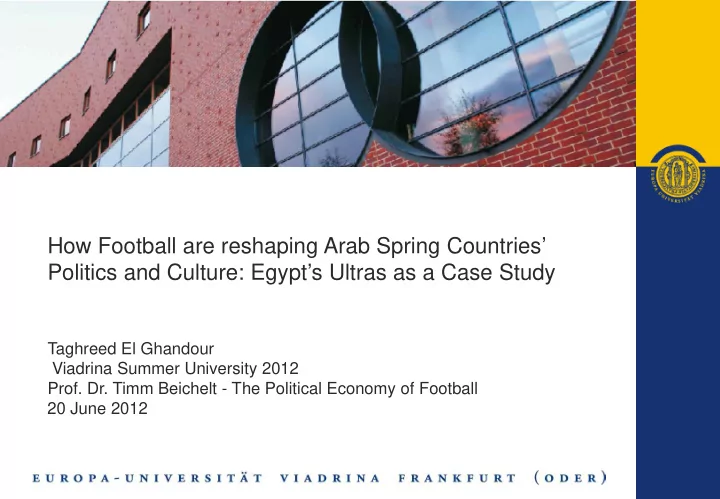

How Football are reshaping Arab Spring Countries’ Politics and Culture: Egypt’s Ultras as a Case Study Taghreed El Ghandour Viadrina Summer University 2012 Prof. Dr. Timm Beichelt - The Political Economy of Football 20 June 2012
Structure • Football and Politics • Football was not politicized by the ultras fans, or the normal football fans. It was just football for fun, and fans from the Ultras groups, who were involved deeply concerning football and who found freedom inside stadiums were considered by the media as hooligans Starting January 25 th , there were several invitations on facebook of • the Youth asking people to go to the streets on marches and mass protests to ask for bread, freedom, and social justice. And the Ultras found their way to the streets, and as a result of the brutal treatment of police security officers, the Ultras converted from just fans to activists, carrying the responsibility of calling for freedom, and the departure of the Mubarak Regime . "We can cope with poverty, but we cannot tolerate oppression. We know what social justice is and we want it.“ as quoted from one of the Ultras leaders.
Structure • Football and Politics • In large part, Egypt's Ultras mirror similar movements in southern Europe, particularly Italy. They first surfaced in 2007, but only burst on the local scene as a distinctive group after Mubarak's fall. Since then, they have made their presence felt in matches with fireworks, incessant chanting and songs taunting the military leadership and police. (video ultras chanting) • Ultra members have been credited with playing a major role in the 18-day popular uprising that toppled longtime dictator Hosni Mubarak, as well as recent street clashes with police. They were the chief defenders of Tahrir Square, the uprising's epicenter, when Mubarak loyalists on camel- and horse-back charged protesters on Feb. 2, 2011, one of the deadliest days of the uprising. Just as brutal as the portsaid massacre that took place Feb 1, 2012. • http://www.youtube.com/watch?v=ySEfAMo0tgs
Structure • Statement 1 • Clubs in Egypt became increasingly central part of people’s identity, and Fans found their identity in football
Structure • Identity and Football in Egypt • In Egypt, fans found their identity in football, but just like in many Arab countries, football is no longer regarded as a sport or business, rather it became a source of identity. • We can say that young fans by joining to the ultras groups, they began to create alternative group, which launched from the virtual groups of football forums on the internet to the organizational entities in the real world, that expand to form an alternative Home (Nation). This alternative home (Nation) does not mean a distinctive national belonging, otherwise it is in the sense of forming a private domain or new world where it represents the way of life for these youth. For them, becoming a football fan became a symbolic action that is both joyful and a means of self-expression, but the broader social, psychological, and cultural contexts in Egypt were unable to adapt to the groups’ activities in part by virtue of their rebellious nature and their defiance of norms.
Structure • Usage of football by political actors: • In Egypt, Mubarak regime used football as a way of mobilizing to his regime. Actually it was his son’s idea to use the energy of the youth inside the stadium to show to the Egyptians the size of the support that the regime had, and the evidence is that he used to attend and support all the games (matches) played by the National Team, and meet up with the players, so one can say that he used this sport implicitly to politicize football, especially that there were huge crowd of fans attending. • Mubarak also used football as a means to present himself as a host of international mega events like the African League, it was politicized by the regime but not by the fans
Structure • Statement 2 • Mubarak have mainly used football as a means to present himself as a host of international mega events like the African Cup of Nations (year 1986)
Bibliography • Mohamed Gamal Beshir, The Ultras: When Fans Cross Natural Boundaries. Dar El Shorouk, 2012). • Ashraf El Sherif, The Ultras Politics of Fun Confront Tyranny, Middle East Institute, No. 53, Feb 2012, p. 1-6. • Sevecen Tunç , A Game of Two Halves: Football and Politics In Egypt . Jan 15, 2012, p. 1-10. • Sherif Tarek, Egypt’s Ultras: Politically involved but not politically Driven. Jan 2012, p. 1-3, website: http://english.ahram.org.eg/news31904.aspx. • Farah Montasser, Ultras Football Fans Inspired by Egypt’s Ongoing Revolution Create Pop Culture. Jan, 2012, p. 1-2, Website: http://english.ahram.org.eg/news/32308.aspx • Sara Ashour, From Rivalry to Riot: What Went Wrong in Portsaid. Feb 2012, p. 1-2, Website: http://www.acus.org/egyptsource/rivalry-riot-what-went-wrong-port-said. • Tom Dunmore, First Person Ultra: Ultras Ahlawy, Egypt. Nov 2007, p. 1-2, Website: www.pitchinvasion.net/blog/2007/11/27/first-person-ultra-ultras-ahlawy-egypt. • Bassem Hafiz, Football Fans as Revolution: Transscending the Conventional. Jan 2012, p. 1-2, Website: http://www.thedailynewsegypt.com/books/football-fans-as-revolution-transcending-the-conventional-dp2.html. • Youssef Hamza, Egypt’s Ultras Have Shown Military Rule The Red Card. Feb, 2012, p. 1-2, Website: http:// www.thenational.ae/news/world/middle-east/egypts-Ultras-have-shown-military-rule-the-red-card. • James Montague. “How Al-Ahly and Zamalek Buried the Enmity to Topple Murbarak,” www.thenational.ae, 23 April 2011. • James Montague, Egyptian Football: A Hot Bed of Rivalries Antagonism and Politics, Feb, 2012, p. 1-2. Website: http://www.guardian.co.uk
Recommend
More recommend